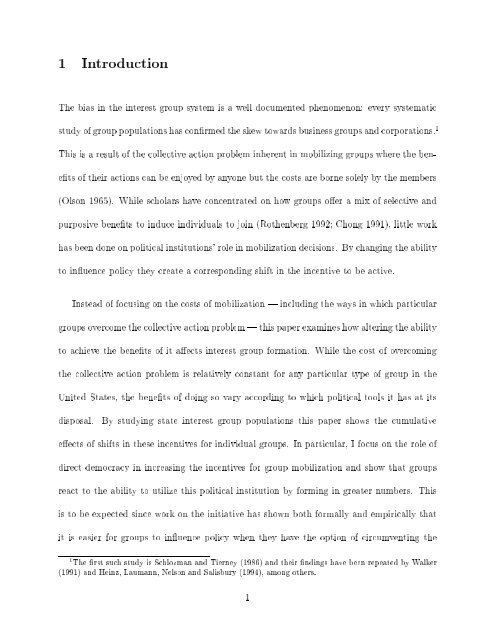Populists in the Pluralist Heaven:
Populists in the Pluralist Heaven:
Populists in the Pluralist Heaven:
Create successful ePaper yourself
Turn your PDF publications into a flip-book with our unique Google optimized e-Paper software.
1 Introduction<br />
The bias <strong>in</strong> <strong>the</strong> <strong>in</strong>terest group system is a well documented phenomenon: every systematic<br />
study of group populations has con rmed <strong>the</strong> skew towards bus<strong>in</strong>ess groups and corporations. 1<br />
This is a result of <strong>the</strong> collective action problem <strong>in</strong>herent <strong>in</strong> mobiliz<strong>in</strong>g groups where <strong>the</strong> ben-<br />
e ts of <strong>the</strong>ir actions can be enjoyed by anyone but <strong>the</strong> costs are borne solely by <strong>the</strong> members<br />
(Olson 1965). While scholars have concentrated on how groups o er a mix of selective and<br />
purposive bene ts to <strong>in</strong>duce <strong>in</strong>dividuals to jo<strong>in</strong> (Ro<strong>the</strong>nberg 1992; Chong 1991), little work<br />
has been done on political <strong>in</strong>stitutions' role <strong>in</strong> mobilization decisions. By chang<strong>in</strong>g <strong>the</strong> ability<br />
to <strong>in</strong> uence policy <strong>the</strong>y create a correspond<strong>in</strong>g shift <strong>in</strong> <strong>the</strong> <strong>in</strong>centive to be active.<br />
Instead of focus<strong>in</strong>g on <strong>the</strong> costs of mobilization | <strong>in</strong>clud<strong>in</strong>g <strong>the</strong> ways <strong>in</strong> which particular<br />
groups overcome <strong>the</strong> collective action problem | this paper exam<strong>in</strong>es how alter<strong>in</strong>g <strong>the</strong> ability<br />
to achieve <strong>the</strong> bene ts of it a ects <strong>in</strong>terest group formation. While <strong>the</strong> cost of overcom<strong>in</strong>g<br />
<strong>the</strong> collective action problem is relatively constant for any particular type of group <strong>in</strong> <strong>the</strong><br />
United States, <strong>the</strong> bene ts of do<strong>in</strong>g so vary accord<strong>in</strong>g to which political tools it has at its<br />
disposal. By study<strong>in</strong>g state <strong>in</strong>terest group populations this paper shows <strong>the</strong> cumulative<br />
e ects of shifts <strong>in</strong> <strong>the</strong>se <strong>in</strong>centives for <strong>in</strong>dividual groups. In particular, I focus on <strong>the</strong> role of<br />
direct democracy <strong>in</strong> <strong>in</strong>creas<strong>in</strong>g <strong>the</strong> <strong>in</strong>centives for group mobilization and show that groups<br />
react to <strong>the</strong> ability to utilize this political <strong>in</strong>stitution by form<strong>in</strong>g <strong>in</strong> greater numbers. This<br />
is to be expected s<strong>in</strong>ce work on <strong>the</strong> <strong>in</strong>itiative has shown both formally and empirically that<br />
it is easier for groups to <strong>in</strong> uence policy when <strong>the</strong>y have <strong>the</strong> option of circumvent<strong>in</strong>g <strong>the</strong><br />
1 The rst such study is Schlozman and Tierney (1986) and <strong>the</strong>ir nd<strong>in</strong>gs have been repeated by Walker<br />
(1991) and He<strong>in</strong>z, Laumann, Nelson and Salisbury (1994), among o<strong>the</strong>rs.<br />
1


